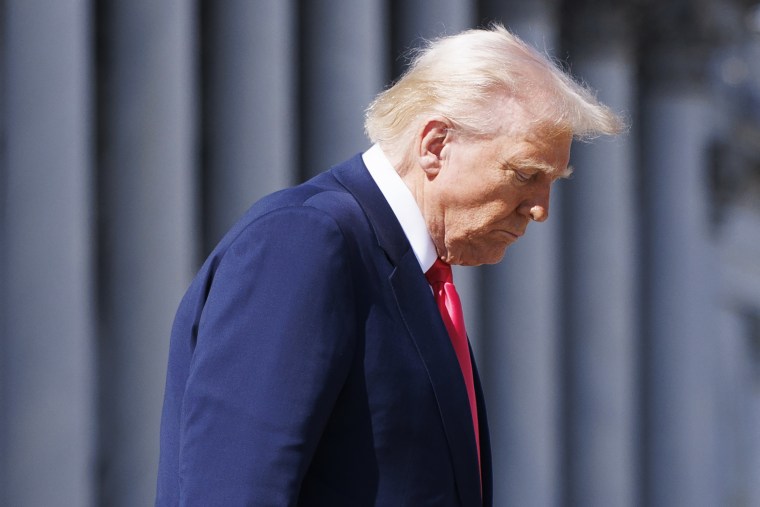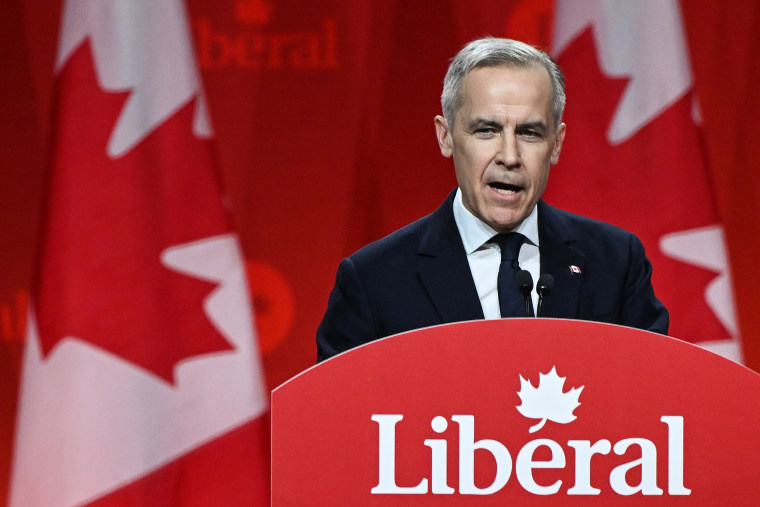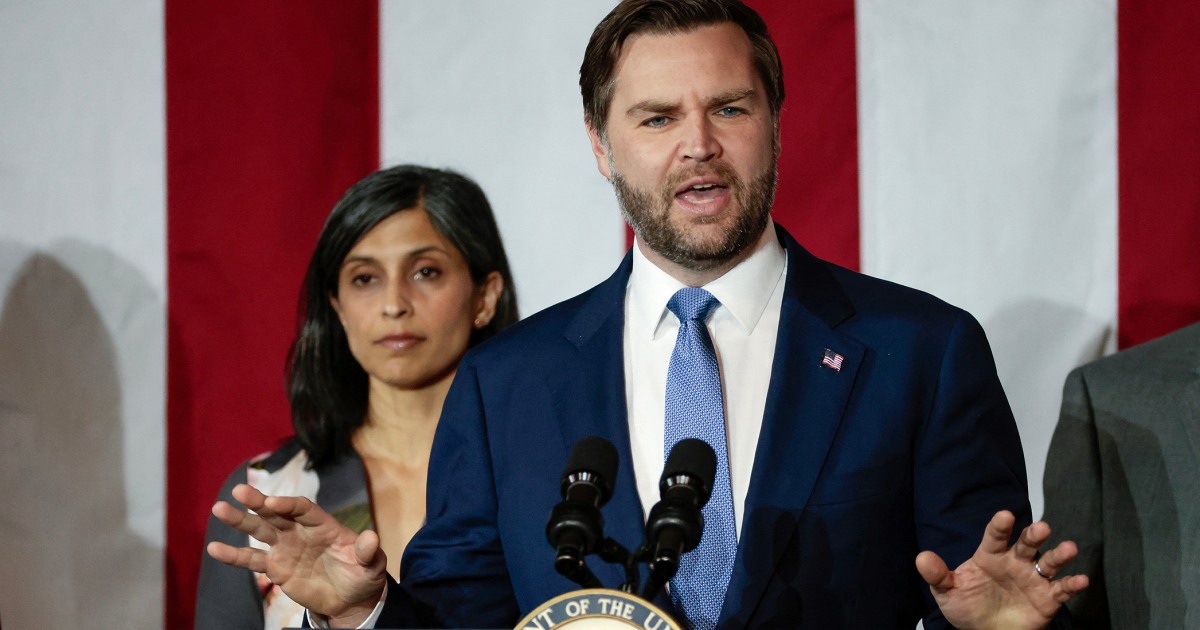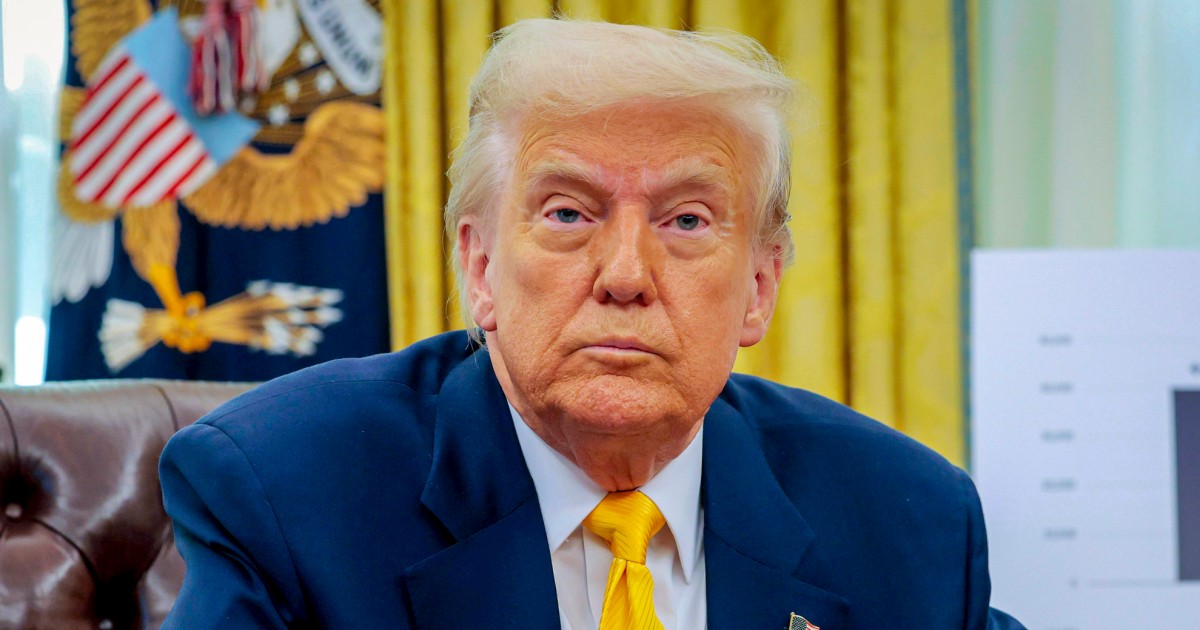BREAKING NEWS
Trump’s economic troubles put Republicans on the defensive
WASHINGTON — President Donald Trump’s full-speed-ahead approach to making radical change has forced his allies to fight from a defensive posture — explaining his plans after they have been executed — and raised alarms in his Republican Party that it could all end in a wreck.
The concerns are particularly acute when it comes to the economy, with the Dow Jones Industrial Average having lost about 7% of its value this month and many economists projecting either slower growth or a coming recession. Those fears haven’t deterred Trump from continuing to impose tariffs on foes and friends — which figure to raise prices on U.S. consumers — and slash federal government jobs, grants and contracts.
“There are worries,” said a person who has been involved in discussions about the economy with White House officials. Those effects on the markets and the economy are felt immediately, while policies aimed at spurring growth — including cutting taxes and regulations — will take much longer to implement, this person said.
Privately, officials at the White House’s National Economic Council have indicated fears that it could be difficult to rebound quickly from a downturn, two people familiar with internal White House discussions said.
A second person who speaks frequently to administration officials said the White House is trying to take a long view of the economic tremors. But that approach comes with significant risk — both to the economy and to Republicans’ political standing — if the turnaround doesn’t happen. Many of those administration officials think tariffs aren’t sound policy — and won’t ultimately be enacted for any extended period of time — but, this person said, Trump “doesn’t want to talk to them right now.”
The White House didn’t respond to a request for comment.

The dark economic clouds are forcing Trump administration officials into the awkward position of explaining why a president who promised to boost the economy simply by winning election now faces falling stock prices, job losses that he incurred with unilateral cuts to government agencies and mounting predictions of a sluggish economy.
“This was always part of the plan,” Agriculture Secretary Brooke Rollins said Tuesday on Fox News, perhaps forgetting Trump’s campaign trail promises. “The president is so focused on — not the short term. … He truly wants to fix America.”
That’s a different sentiment from what Trump expressed on the campaign trail as he asked for votes.
“Starting on Day 1 of my new administration, we will end inflation, and we will make America affordable again,” he said at a rally in Saginaw, Michigan, in October.
The messaging complications go beyond his handling of the economy and extend to domestic policies that have been undertaken without Congress.
Education Secretary Linda McMahon, who summarily fired half her department’s workers this week, said Wednesday on social media that the goal of the action “is not to take away education.”
“It’s to take the bureaucracy out of education,” wrote McMahon, who has been tasked with eliminating the entire Education Department.
The layoffs, affecting thousands of workers, were announced as Trump is pushing Congress to send him a spending bill that would provide tens of billions of dollars for a department that he has said he intends to eliminate entirely.
Sen. Mike Rounds, R-S.D., said he thinks Trump has some latitude to pursue trade wars — tariffs have been imposed on Europe, China, Canada and Mexico already this year — but not at a long-term cost.
“Look, this isn’t the way I would do it,” Rounds said of the White House’s tack. “I think they want to try something different than from the previous administration. But they’ve got to show some success fairly quickly.”
Rounds’ Republican colleagues are giving mixed reviews of Trump’s trade policies — some of which have been announced and then quickly reversed in the wake of retaliation by other countries and pushback from domestic businesses.
Sen. Rand Paul, R-Ky., said Trump’s “dramatic tariffs” on Canada and Mexico “could be devastating to the economy,” including in his home state.
“There are stories coming out talking about cars costing $10,000 more. And, of course, we’re worried about bourbon. We want to sell our bourbon. The Canadians are going to block our bourbon,” Paul said. “Now that you add lumber costs to that and steel with tariffs, nobody at home is coming up to me and saying please put tariffs on.”
For Republicans facing re-election next year, omens of economic turmoil aren’t welcome. Trump hasn’t ruled out a recession.
“That’s not what you want to hear,” said Sen. Thom Tillis, R-N.C., who is on the ballot in 2026. Still, he added that Trump might be right to set realistic expectations.
“On the one hand, he is being honest, but on the other hand, we have to do everything we can to avoid it for a variety of reasons,” Tillis said. “It doesn’t really spook me. I have more of a concern about the impact that it has on investment and economic growth.”
Republican Sen. Tim Sheehy, newly elected to a safe seat in Montana, said he is fully behind Trump’s economic moves.
“The stock market doesn’t like uncertainty, and right now, people aren’t sure what’s coming next,” Sheehy said. “I think what we’re going to see is — throughout the year, we’re going to see one of the strongest economies in a generation as we reorient the government’s fiscal position as one of strength and growth. … So temporary disruptions, but growth is coming.”
What is confounding to many of Trump’s allies is his decision to inject the uncertainty himself. For decades, including as a presidential candidate, Trump has looked at tariffs as an economic boon for the country. He describes them as a tax on foreign countries. But the cost of the duties, most economists say, are ultimately borne by U.S. businesses and consumers.
Lawmakers, donors and business leaders are concerned about both the tariff policies and the broader economy, said a Trump ally who has heard from all three groups. Those worries are less about the concept of tariffs and more about what appears to be a lack of strategy in brandishing and imposing them, this person said.
But the needle is moving when it comes to trade policy and government cuts that have raised the ire of lawmakers’ constituents, said a Republican strategist whose clients include members of the House and the Senate.
“At some point, members of Congress start going into full freak-out mode,” the strategist said. “I don’t know that that point has been reached on the economy per se. I think it’s been reached on some of the DOGE stuff and some of the tariff stuff.”
BREAKING NEWS
How Trump united Canada against him and flipped its election upside down

The hostility extends to homegrown Trump supporters such as Canadian hockey legend Wayne Gretzky, who was at Trump’s Mar-a-Lago resort on election night and attended his inauguration. This week, viral photos from a Toronto liquor store showed labels under Gretzky’s wine range altered to include descriptions such as “weak & backstabbery.”
Former Prime Minister Jean Chrétien said Trump had “united us as never before.”
“I think I will propose him for the Order of Canada,” the country’s highest civilian honor, Chrétien joked as the governing Liberal Party met in Ottawa last weekend to elect a successor to Canada’s leader of almost a decade, the highly unpopular Justin Trudeau.
Experts say the man they overwhelmingly chose, Mark Carney, may be uniquely positioned to push back against Trump’s aggression, with a background in finance and crisis management that includes running the Bank of Canada after the 2008 global financial crisis and the Bank of England during the Brexit process.
Like Trump, Carney, who took office as prime minister on Friday, spent much of his life in the private sector and had never held elected office before becoming his country’s leader.
“He’s been sort of the global elite all his life,” Malloy said. “Normally, that’s not really the route for success for a rookie politician. But these are unusual times.”
‘Resurrected from the dead’
Only a few months ago, the Liberals under Trudeau were looking like “absolute toast” in the next Canadian election, which is required to take place by October of this year, Malloy said.
With his approval rating already at an all-time low, Trudeau’s problems were only compounded by Trump’s tariff threats, which began shortly after he was elected in November.
Internal disagreement over how to respond to those threats created turmoil among the Liberals, with Finance Minister Chrystia Freeland’s scathing resignation letter in December ultimately forcing Trudeau to announce he would step down.

It seemed almost certain the Liberals would be thrashed in the next election by the Conservative Party, led by Pierre Poilievre.
Poilievre, whose style has been described as “Trump light,” had embraced the populist wing of his party, expressing support for truckers who paralyzed Ottawa with anti-vaccine protests in 2022. Among his supporters was Elon Musk.
Then Trump happened.
On his first day in office, Trump announced a 25% tariff on imports from Canada and Mexico, two of the biggest U.S. trading partners. Those tariffs were paused for a month before going into effect on March 4. Markets immediately began convulsing, and in the days that followed, Trump exempted more than a third of goods coming from Canada until April 2.
Trump said he was imposing the tariffs on Canada and Mexico because of their role in the U.S. fentanyl crisis and illegal immigration, mystifying Canadians who point to the U.S. government’s own data showing that Canada is responsible for less than 1% of the fentanyl and undocumented migrants coming across the northern and southern U.S. borders.
Canada is also subject to the 25% U.S. tariff on steel and aluminum imports that took effect globally on Wednesday.
Ottawa responded to those tariffs with its own levies on some $21 billion worth of U.S. goods, and it has also requested a dispute consultation at the World Trade Organization.
Alongside the tariffs, Trump has repeatedly referred to Trudeau as the “governor” of Canada, which with 40 million people has about the same population as California.
Trump’s derision continued on Thursday even as his secretary of state, Marco Rubio, made his first official trip to Canada for a meeting of top diplomats from the Group of Seven industrialized democracies.
“To be honest with you, Canada only works as a state,” Trump said from the Oval Office.
Asked about the issue on Friday, Rubio said it had not come up at the G7 meeting but that there was a “disagreement” between Trump’s position and the position of the Canadian government.
Canadian Foreign Minister Mélanie Joly said she told Rubio that “Canada’s sovereignty is not up to debate.”
“You’re in our country, you respect our people. Period,” she said at a news conference after the meeting in La Malbaie, Quebec.
Fueled by anger at Trump, Canadians have expressed growing support for the Liberals in the upcoming election, almost entirely closing the gap with the Conservatives in a matter of weeks. The Conservatives, who had a lead of almost 20 points a month ago, are now ahead by only 1 percentage point, the Canadian polling firm Nanos said this week.
“The Liberals have basically been resurrected from the dead” because of the crisis Trump created, Malloy said.
As Carney took office on Friday, he rejected Trump’s statehood proposal, saying “America is not Canada.”
“We will never, ever, in any way, shape or form, be part of the United States,” Carney, who turns 60 on Sunday, said after being sworn in.

Though Carney is a novice politician, that could work in his favor, said Maite Gonzalez Latorre, a program assistant at the Atlantic Council in Washington who is from Edmonton, Alberta.
“Mark Carney has experience in the U.K., he has experience in Canada, but he also has private sector experience,” Gonzalez Latorre said, “which I think will give him an advantage, especially when it comes to tariffs and and speaking with Trump directly.”
Carney’s top concerns for the moment, she said, are how to deal with Trump and how the U.S. tariffs are going to affect Canadians. His next moves and Trump’s response to them will influence when Carney calls the election, which could still end in victory for the Conservatives.
As with so many of Trump’s policies and actions, Malloy said, it remains unclear what exactly he is trying to achieve with his antagonism toward Canada.
His actions may have sidelined a potential ally in Poilievre, “who would have been a relatively supportive leader,” Malloy said. And though he took down Trudeau, Trump also revived the fortunes of Trudeau’s party, which is staunchly opposed to his policies.
“What is Mr. Trump’s endgame other than chaos? And what’s the point?” Malloy said. “Because so far, he’s only doing things that hurt his interests and the interests of the United States.”
BREAKING NEWS
Vance discusses Elon Musk and the economy in NBC News interview

WASHINGTON — Vice President JD Vance acknowledged Friday that Elon Musk has made “mistakes” while executing mass firings of federal employees and emphasized that he believes there are “a lot of good people who work in the government.”
“Elon himself has said that sometimes you do something, you make a mistake, and then you undo the mistake. I’m accepting of mistakes,” Vance said in an interview with NBC News.
“I also think you have to quickly correct those mistakes. But I’m also very aware of the fact that there are a lot of good people who work in the government — a lot of people who are doing a very good job. And we want to try to preserve as much of what works in government as possible, while eliminating what doesn’t work.”
Vance’s gentler tone represented a contrast from the chainsaw approach that Musk, the world’s wealthiest man, has taken as he leads President Donald Trump’s initiative to slash federal spending and reorient the federal bureaucracy. The firings of thousands of government employees has been the centerpiece of Musk’s work over the first seven weeks of Trump’s second White House administration, with the cuts yielding lawsuits and pushback from judges. Musk has broadly characterized federal workers as “fraudsters” who can’t be trusted to do their jobs.
“I think some people clearly are collecting a check and not doing a job,” Vance said when asked about such comments from Musk. “Now, how many people is that? I don’t know, in a 3 million-strong federal workforce, whether it’s a few thousand or much larger than that.”
“However big the problem is, it is a problem when people are living off the generosity of the American taxpayer in a civil service job and not doing the people’s business,” he added. “That doesn’t distract or detract from the fact that you do have a lot of great civil servants who are doing important work. But I think most of those great civil servants would say we want to be empowered to do our job. We don’t want the person who doesn’t show up five days a week to make it harder for us to do what we need to do.”
Vance’s comments came during an exclusive and wide-ranging interview aboard Air Force Two, as the vice president and second lady Usha Vance returned from a visit to a plastics factory in Bay City, Michigan. His motorcade’s ride into town illustrated how different life is now for him and his young family.
Dozens of protesters had lined the street leading to the factory, greeting Vance and his traveling party with middle fingers and vulgar signs, one of which featured a crossed-out swastika and read “Go home, scumbag.” The previous night, Vance was booed while arriving for a performance at the Kennedy Center in Washington. And while walking with his 3-year-old daughter near their home in Ohio last weekend, Vance found himself in a civil but, in his description, upsetting conversation with pro-Ukraine demonstrators.
“The thing at the Kennedy Center I thought was funny,” Vance said aboard his plane Friday afternoon. “The thing by my house I thought was kind of annoying. I think you just kind of take the good with the bad. … I kind of just see it as, depending on your perspective, a feature or a bug of this new life.”
In his remarks at the factory, where he was welcomed by a friendlier, pro-Trump audience filled with local Republicans, Vance touted the administration’s commitment to manufacturing and economic recovery while tempering expectations for the rapid turnaround that Trump promised on the campaign trail.
A majority of respondents in two polls released this week — 56% of adults surveyed by CNN, 54% of registered voters surveyed by Quinnipiac University — said they disapproved of how Trump is handling the economy. Meanwhile, Trump’s push for tariffs on foreign products has ignited fears of a trade war that could raise consumer prices.
“Now I have to be honest with you,” Vance said in Bay City. “The road ahead of us is long, but we are already, in just seven short weeks, starting to see early indications of the president’s vision becoming our shared American reality.”
During the campaign, Vance frequently spoke of a woman he had met who said that she and her husband could no longer afford their weekly tradition of grilling steaks on Friday nights. Reminded of that story aboard his plane Friday, Vance described recent lower gas prices as a positive sign.
Vance also acknowledged that “you already see things leveling off to, not an ideal situation, but a much better and more significant improvement” while casting blame on former President Joe Biden, whose policies he said had left Trump in a hole.
“My ambition is that we see some pretty quick results, that you start to see at least a pathway towards financial stability,” said Vance, specifically noting 10,000 manufacturing jobs added last month. “You’re going to see progress. I think it’s going to be incremental progress. But I also think it’s important to be honest with people that you don’t get to $2 trillion deficits overnight. You’re not going to get out of $2 trillion deficits overnight.”
Vance also discussed his early role in shaping and articulating Trump’s foreign policy agenda, from a provocative speech at last month’s Munich Security Conference to an extraordinary Oval Office clash two weeks ago with Ukrainian President Volodymyr Zelenskyy, whom Vance had accused of being insufficiently thankful for U.S. aid.
“I just try not to be overly scripted,” Vance said before recalling his speech in Munich, which upbraided European leaders over issues such as free speech and mass migration. “The classic thing to do in Munich would have been to show up and give a speech about NATO or give a speech about where the Ukraine-Russia thing was at that moment in time, and just sort of thought to myself, like, ‘What is it that I think is really important to say?’ And the president was OK with me saying it, so I said it.”
Vance added that he doesn’t “go into these things trying to be like a spokesman for the administration. Some of that happens naturally, but fundamentally, the president is the spokesman for the administration, and everything flows from there. I try to do a good job. I try to say things both that I think are true but also are in accordance with the president’s preferences. And let the chips fall where they may.”
Trump, who is constitutionally barred from serving another term, raised eyebrows in a Fox News interview last month by saying it was “too early” to anoint Vance as his successor in 2028. Vance and others close to Trump have since brushed off the question and Trump’s answer to it, agreeing that such talk was premature.
Asked a variation of the question Friday — does he view himself as Trump’s successor? — Vance replied that he’s not thinking about a presidential campaign at the moment. He related the story of how he felt on Election Night, when, surrounded by his closest friends and family, it became clear he had won the vice presidency.
“Wow, I’m the vice president-elect of the United States,” Vance recalled thinking. “And, you know, if I never go further in politics, I’m totally fine with that, but we get a really good opportunity to do a lot of really good s— the next four years.”
“If I do really well for the next four years, everything else will take care of itself. … Now, like, yeah, in two and a half years, will that become harder? Will people be more focused on politics than on what the White House is maybe doing that particular day? Maybe,” he added.
“I mean, man, if I was like a central figure to getting the Russia-Ukraine crisis solved, who gives a s— what I do after this?” Vance said. “That’s kind of the attitude I take. So I’m very focused on doing a good job.”
BREAKING NEWS
Senate votes on government funding bill today; Trump delivers remarks at DOJ

Democratic campaign committees and state parties are partnering to host a series of town halls in Republican-held districts after congressional Republicans were advised against holding more town hall-style events in person following tense interactions that went viral.
The list of districts where Democrats plan to hold events includes several that are held by GOP lawmakers who are expected to have close House races next year: Rep. Juan Ciscomani in Arizona’s 6th District, Rep. Gabe Evans in Colorado’s 8th District, Rep. Zach Nunn in Iowa’s 3rd District, Rep. John James in Michigan’s 10th District, Rep. Don Bacon in Nebraska’s 2nd District, and Reps. Ryan Mackenzie and Rob Bresnahan in Pennsylvania’s 7th and 8th districts, respectively.
Democratic National Committee Chair Ken Martin said in a statement that Republican lawmakers are “terrified to be in the same room as the people who sent them to Washington.”
“If they won’t talk to their own voters, then Democrats will. That’s why we’ll be hosting People’s Town Halls in all 50 states across the country, starting now with vulnerable GOP-held target districts. Working families deserve to have their voices heard, even if Republicans want to ignore them,” Martin added.
Democratic Congressional Campaign Committee Chair Susan DelBene, D-Wash., said in a statement that congressional Republicans “are failing to do the most basic aspect of their jobs: meeting with the people they represent.”
The move from Democrats, who have been on their heels since the start of the Trump administration, comes after several GOP lawmakers were confronted at town halls in their districts.
In one instance, videos showed attendees booing Sen. Roger Marshall, R-Kan., after he defended Elon Musk’s Department of Government Efficiency. In another instance, Rep. Keith Self, R-Texas, was confronted with chants of “Vote you out,” at one of his town halls.
Republicans have accused Democrats of organizing protesters to attend Republican-led town halls and disrupting them.
-

 Conflict Zones2 days ago
Conflict Zones2 days agoUS attacks kill 4 in Yemen as second aircraft carrier sent to Middle East | Military News
-

 Lifestyle2 days ago
Lifestyle2 days agoCooking with kids teaches healthy eating and more
-

 Middle East2 days ago
Middle East2 days agoIsrael’s war on Gaza deadliest conflict ever for journalists, says report | Gaza News
-

 Education1 day ago
Education1 day agoNashville school shooter sought fame in 2023 attack that left 6 dead, report finds
-

 Europe2 days ago
Europe2 days agoAlex Ovechkin: A leap year ploy could have altered hockey history as Capitals captain closes in on Wayne Gretzky’s ‘unreachable’ goal record
-

 Europe1 day ago
Europe1 day agoLive updates: Trump announces sweeping new tariffs on imports on ‘Liberation Day’
-

 Asia1 day ago
Asia1 day agoMyanmar’s military government announces temporary ceasefire to aid quake efforts
-

 Sports2 days ago
Sports2 days agoFreddie Freeman misses Los Angeles Dodgers game after injuring ankle in shower ‘mishap’




